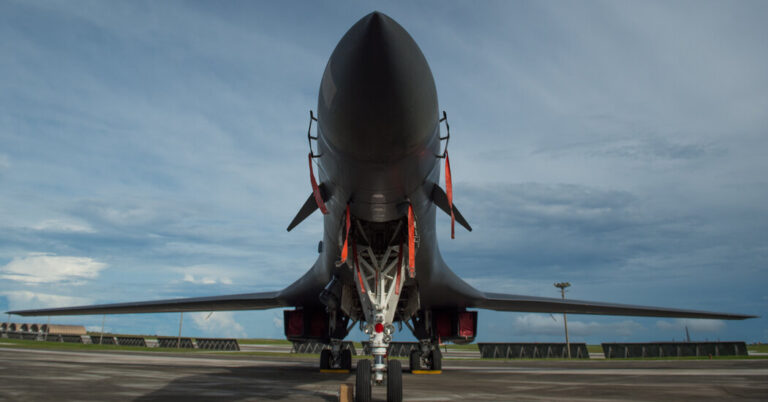A senior Biden administration official warned Friday that “absent a change” in Chinese and Russian nuclear strategies, the United States could be forced to expand its nuclear arsenal after decades of reductions through now-largely abandoned arms control agreements.
National Security Council Senior Director Pranay Badi’s comments Friday were the clearest public warning yet that the United States is prepared to shift from merely modernizing to expanding its nuclear arsenal. They were also a warning to Russian President Vladimir V. Putin about how the United States might respond if the last major nuclear arms control agreement, called the New Strategic Arms Reduction Treaty, expires in February 2026 without a replacement agreement.
Speaking at the annual conference of the Arms Control Association, a group that advocates for nuclear arms limitation, Vadi acknowledged what officials have been saying for more than a year in private conversations and closed-door congressional testimony: This is the inevitable outcome of China’s rapid nuclear expansion and repeated threats by Russia to use tactical nuclear weapons in Ukraine.
But it would be a monumental change, one that poses risks that many Americans thought they had overcome with the end of the Cold War and the collapse of the Soviet Union.
Fifteen years ago, President Barack Obama envisioned a world without nuclear weapons and took steps to reduce the role of nuclear weapons in U.S. strategy and defense. U.S. nuclear facilities were upgraded and made safer, and older weapons were replaced with newer, more reliable models, but he insisted the United States was only “modernizing” its nuclear arsenal, not expanding it.
As vice president in the Obama administration, President Biden became a spokesman for this strategy.
At the time, China was still committed to a “minimum deterrence” policy dating back to its first nuclear test in 1964, and Putin seemed to have little interest in a financially ruinous arms race.
China is on track to match the number of nuclear weapons deployed by the United States and Russia by 2035, according to public estimates from the Department of Defense. Putin has a penchant for exotic weapons, such as subsea nuclear torpedoes that could be fired across the Pacific Ocean to destroy the U.S. West Coast, and the United States has warned in recent months that Russia is pursuing plans to launch a nuclear bomb into orbit.
Since Russia invaded Ukraine, there have been no talks with Russia to negotiate a replacement for New START, which would limit each country to 1,550 deployed strategic nuclear weapons capable of intercontinental launch.
China has refused to engage seriously in nuclear negotiations with the United States and has made it clear that it has no interest in arms control until its own nuclear arsenal matches those of the two major nuclear powers. (Britain, France, India, Pakistan, Israel and North Korea all have their own nuclear arsenals, but with much smaller numbers.)
The Biden administration has not abandoned its claim to support a world without nuclear weapons, but officials acknowledge that the prospect of a new arms control agreement now seems so remote that a new strategy must be considered.
Vadi said the development of the B61-13 gravity bomb, a nuclear weapon intended to be used against large, hardened military targets, is one example of a project the United States is pursuing.
For now, the US is improving its nuclear arsenal, not expanding it, but Vadi made it clear that could change.
“Unless there’s a change in the trajectory of our adversary’s weapons, we may reach a point in the next few years where we will need to increase our current deployment numbers, and if the president makes that decision, we need to be fully prepared to execute,” he said.
Vadi said the United States remains open to pursuing arms control agreements to reduce nuclear threats by “limiting and shaping” adversaries’ nuclear capabilities, noting that such deals have a history of being pursued through separate diplomatic channels and suggesting Russia’s war in Ukraine would not be an impediment to talks.
But Russia’s refusal to engage in talks on a New START successor agreement “casts a shadow” over diplomatic issues, he said.
“The outlook for strategic arms control is bleak, at least in the short term,” he said.
A year ago, at the same conference, National Security Adviser Jake Sullivan pledged renewed efforts to bring China into arms control talks. Since that speech, the United States has been trying to negotiate with China on nuclear safety issues, recently holding initial talks in Geneva to see whether they could agree on limitations such as that artificial intelligence should never take control of nuclear weapons.
The meeting was exploratory and it is unclear whether other meetings will follow. China has urged the United States to adopt a so-called “no first use” policy on nuclear weapons use, but has not substantively engaged in the U.S. proposal.
One of the complications of the current nuclear environment, administration officials said, is the possibility that Russia and China could coordinate their nuclear policies as part of the “unlimited partnership” that Putin and Chinese President Xi Jinping announced in 2022.
Vadi said the failure of Russia and China to engage in meaningful negotiations “forces the United States and our close allies and partners to prepare for a world of nuclear competition without constraints on numbers.”
He argued that modernizing the U.S. nuclear arsenal would motivate both Russia and China to return to the negotiating table, putting the U.S. in a stronger position in negotiations.
“We need to convince our adversaries that managing conflict through arms control is preferable to unrestrained competition,” he said.

